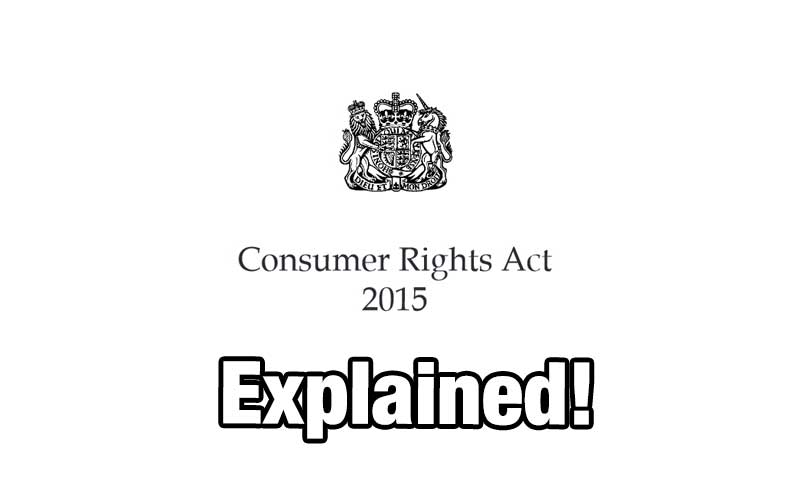The Consumer Rights Act came into force on 1 October 2015, if you purchased something prior to this date the Sale of Goods Act 1979 applies to your purchase so please read that instead.
This law was changed to make it clearer for consumers and to ensure they feel safer buying from retailers & service providers, the whole idea is to speed up the process of sorting out issues with a product or service.
Just like Sale of Goods Act the following applies to all products & services (& now digital goods as well), basically you have to prove the following isn’t true:
- The goods will match the description given of them.
- The goods will be of satisfactory quality.
- The goods will be reasonably fit for any particular purpose that was made known to the retailer (unless the retailer disputed their appropriateness for that purpose at the time)
Note: For services & contracts there are slight variations to these rules. If your issue is with a service read this. If your issue is with an unfair contract read this.
I’ve had a problem with a physical item, what do I do?
First of all speak with the company (that you purchased the item from), most companies will be willing to sort the issue out. Don’t go all guns blazing talking about Consumer Rights, just explain and see what they offer/do first.
If you get nowhere now it’s time to kick it up a gear, remember the law applies to the company you’ve purchased from and not the manufacturer so ensure you direct your complaint to them.
At first contact via email or letter will be enough, explain the issue, the law and how you’re covered. If this doesn’t get you anywhere then speaking with the relevant ombudsman will give you the best chance of a solution to your problem.
Pick which ever applies to you:
- Problem within the first 30-days of ownership
- Problem within 30-days & 6-months of ownership
- Problem within 6-months & 6-years of ownership
1) Problem within 30 days of purchase:
Under the Consumer Rights Act 2015 you can reject any item (excluding perishable items & digital) and get a full refund if the goods are of unsatisfactory quality, unfit for purpose or not as described.
You may be offered a partial refund or repair but we would suggest you go for a full refund instead and then purchase again so you get a new product with a new warranty etc.
What about perishable items?
You’re still entitled to a full refund just like above HOWEVER the 30-day period is reduced to “a reasonable time” e.g. flowers that state “fresh for 7 days”, if they were to die after 5 days you would be entitled to a full refund.
What about digital items (e.g. apps, music, games, etc)?
You can only ask for a digital product to be repaired or replaced if it develops a fault. If that repair or replacement doesn’t fix the issue, then you have the right to ask for a price reduction, which can be up to 100% of the original cost of the digital content.
Also worryingly for retailers (but good for consumers) is that the retailer will have to compensate you if any device or other digital content you own is damaged as a result of the digital content you’ve downloaded from them.
My delivery hasn’t arrived within 30 days (or on the agreed date)
The default delivery period that a retailer must deliver your items to you is 30 days (maximum), unless you’ve agreed a longer period, if the retailer fails to deliver your item within this timescale or on the agreed date then you’re within your rights to cancel the order for a FULL refund.
My item was damaged / lost in transit, what can I do?
The retailer is responsible for goods up until you get possession of them (e.g. when the parcel is delivered & you’ve signed for the parcel).
The delivery company IS NOT RESPONSIBLE so any issues should be dealt directly with the retailer you purchased from.
If you’re purchasing something of high value then get into the habit of opening the parcel before you sign for something.
Further reading can be found on the Government Legislation website.
2) Problem outside of 30 days but before 6 months of ownership:
You must give the retailer the opportunity to repair or replace the product (including digital) if the goods are of unsatisfactory quality, unfit for purpose or not as described.
If you find an issue with the product within 6 months of purchase it is presumed to have been there from before you purchased the item – unless the retailer can prove that isn’t correct. e.g. if the retailer can prove you’ve damaged an item then you wouldn’t be completely protected.
The retailer has the right to decide if they repair or replace, you cannot force them.
If the repair or replacement is unsuccessful then you’re entitled to reject the item and demand a partial refund (& keep the product) or a full refund (& return the product), however, if you wish to keep the product you have the right to request the retailer makes further attempts at a repair or replacement.
The retailer MUST offer you a full refund or partial refund if:
- the cost of the repair or replacement is unreasonable compared with the value of the goods or digital content
- a repair or replacement is impossible
- a repair or replacement would be significantly inconvenient
- the repair would take unreasonably long
- the previous repair has been unsuccessful
A retailer MUST NOT deduct any money from your refund for the use of the product. e.g. you buy a £300 laptop, that you’ve used but became faulty, they offer you a refund but say we can only give you £250 back as you’ve been using the laptop for 4 months with no problems.
The ONLY exception to this rule is when getting a refund on a motor vehicle, the retailer can make a reasonable reduction on the refund in comparison to your usage.
Further reading can be found on the Government Legislation website.
3) Problem between 6 months & 6 years of ownership (5 years in Scotland)
You now have to prove that the issue originated at the time of purchase.
The amount of effort that you may have to go to to prove the above will depend on the retailer & the problem you’ve got, some will request expert evidence or further tests. Making clear points and mentioning how it clearly couldn’t have been you causing the issue will help your case here.
You have up to 6 years to make a small claims court request, however ideally you don’t want to go down that route (yet), make sure you’ve tried hard at getting the problem sorted outside of court. Also it should be made clear this doesn’t mean the product has to last 6 years, it simply means you have up to 6 years to get the retailer to repair or replace the product or you have the right to take them to court over it.
Most retailers will try and avoid court and you should do your up most to avoid it as well (extra costs and the possibility of losing spring to mind) however don’t be put off by the thought of court if your issue hasn’t been resolved.
Further reading can be found on the Government Legislation website.
My issue is with a service (e.g. mobile phone network, house repairs, dry cleaning, entertainment etc)
The Consumer Rights Act is the main protection you have against poor service or service that isn’t as described, the following would give you reasonable grounds to complain & request a resolution:
- The trader must perform the service with reasonable care and skill (e.g. they can’t damage other parts of your property or use poor skill to complete the task).
- Information which is said or written is binding where the consumer relies on it.
- Where the price is not agreed beforehand, the service must be provided for a reasonable price.
- The service must be carried out in a reasonable time.
If the service you’re provided doesn’t satisfy these criteria, you’re entitled to the following remedies under the Consumer Rights Act:
- The trader should either redo the element of the service which is inadequate or perform the whole service again at no extra cost to you, within a reasonable time and without causing you significant inconvenience.
- Or, in circumstances where the repeat performance is impossible or can’t be done within a reasonable time or without causing significant inconvenience, you can claim a price reduction. Depending on how severe the failings are this could be up to 100% of the cost.
What about unfair contracts?
Previously (prior to 1st October 2015) if a contract was in plain English you would have little to complain about, however, thanks to the Consumer Rights Act you’re now protected against unfair contracts even if they’re explained in plain English. Primarily the new law allows you to challenge hidden costs. If your contract was prior to 1st October, it is governed by the ‘Unfair Terms in Consumer Contracts Regulations (UTCCRs)’.
Both the UTCCR & Consumer Rights Act ensured that contracts shouldn’t be deemed to be unfair, you have the right to challenge any contract but a court is the only way to decide if it indeed is unfair.
Contracts would be deemed unfair if
- They are contrary to the requirements of good faith – meaning they must be designed, negotiated and entered into with the consumer in a fair and open way
- They cause a significant imbalance between the rights of the retailer and consumer to the detriment of the consumer (e.g. consumer must give 6 months notice to terminate but the company can give 24 hours notice).
- Any other hidden or default charges that weren’t made obvious to you before agreeing.
- They have excessive cancellation fees, a trader can claim for administration and marketing costs and for any work they’ve started but no more.
- They allow the retailer to significantly change the product or service they provide without giving you the chance to terminate the contract fee free.
- They allowed a retailer or service provider to increase the price of the goods or services prior to the delivery or completion of the work.
What should I do if I believe my contract is unfair:
- Complain to the retailer with your request to amend the contract, cancel the contract (with no or more reasonable fees) or any other reasonable request.
- If the retailer denies this request then don’t rush into any decisions, we suggest you seek legal advice.
- Speak with local trading standards department or the Competition and Markets Authority (CMA)
- If you believe you have a strong case you can take anyone or any company to small claims court and let the court decide, again you really should seek legal advice prior to doing this. If you were to win then most likely you would be entitled to cancel the contract or ignore the term (length of contract).
What can I not claim is unfair?
- If you find a price cheaper (for either a product, warranty or service) elsewhere then you cannot claim your current contract is unfair, it’s just bad luck.
- Challenge terms that you have negotiated with the seller.
What sort of letter should I send to dispute a contract?
[Your address]
[Company/ supplier address]
Dear
[Reference: contract number or service reference number]
I refer to our previous [correspondence/conversation] in which you have stated your contract allows you to [give details of what the contract enables the company to do].
Specifically you seek to rely on the following term in the contract: [give details of the term in question].
I consider that this term is unfair pursuant to the [Consumer Rights Act 2015 OR Unfair Terms in Consumer Contracts Regulations 1999] for the following reasons: [set out your basis for challenging the terms]
For the reasons stated above, this term is not enforceable against me.
[Set out the consequence of the term not being enforceable, for example are you entitled to some money back or are you saying that the trader is not entitled to additional sums that they’re claiming?]
I look forward to hearing from you in the next 14 days.
Yours faithfully,

















